The Future of Aid: Engaging Diasporas in Humanitarian Crisis Response
March 18th, 2025
On Tuesday, March 18th, the Humanitarian Action Initiative hosted the panel, The Future of Aid: Engaging Diasporas in Humanitarian Crisis Response. Speakers highlighted the strengths of diaspora-led humanitarian organizations, including their deep-rooted passion, reliance on volunteerism to reduce administrative costs, and adaptability in addressing evolving challenges on the ground. They also discussed key obstacles such organizations face, such as community fatigue, limited experience in running an NGO, and barriers to accessing grant funding. A special thank you to our speakers, Dr. Jennifer Brinkerhoff, Simret Habtezgi, and Jessica Kanya-Ngambi, for sharing their expertise.
Humanitarian Book Talk Series: Hugo Slim’s Humanitarianism 2.0 – New Ethics for the Climate Emergency
September 19th, 2024
On September 19th, 2024, the Humanitarian Action Initiative hosted Dr. Hugo Slim to discuss his forthcoming book Humanitarianism 2.0: New Ethics for the Climate Emergency. Dr. Slim challenged us to rethink humanitarian emergencies by considering not only human needs but also the needs of nature. He argued for shifting the unit of analysis from people in need to places in need, emphasizing our mutual dependence on the ecosystems that sustain us. The panel also included Dr. Michael Barnett from GW’s Elliott School of International Affairs and Dr. Ramin Asgard from GW’s Milken Institute of Public Health, who shared their insights and offered points of agreement and debate with Dr. Slim’s work.



Real Talk: How does misinformation shape public perception of humanitarian crises?
November 28, 2023
On Tuesday, November 28, 2023, the Student Advisory Council hosted the panel, Real Talk: How does misinformation shape public perception of humanitarian crises?, featured panelists: Babak Bahador, an Associate Research Professor at the School of Media and Public Affairs, and William Youmans, an Associate Professor at the School of Media and Public Affairs.
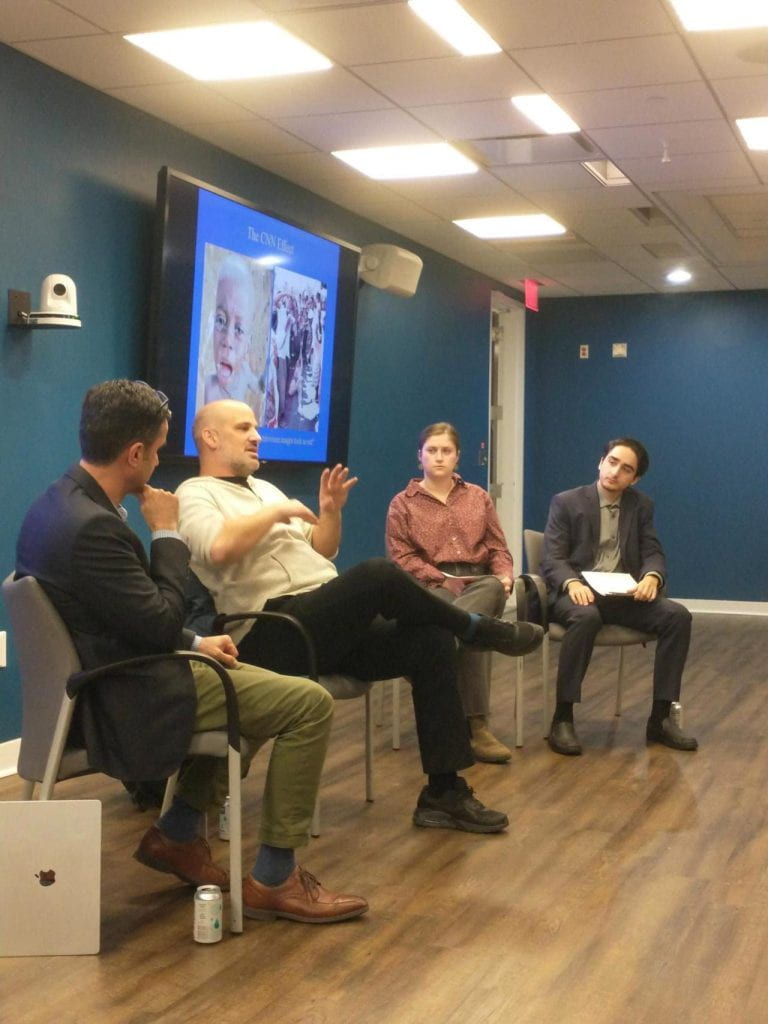
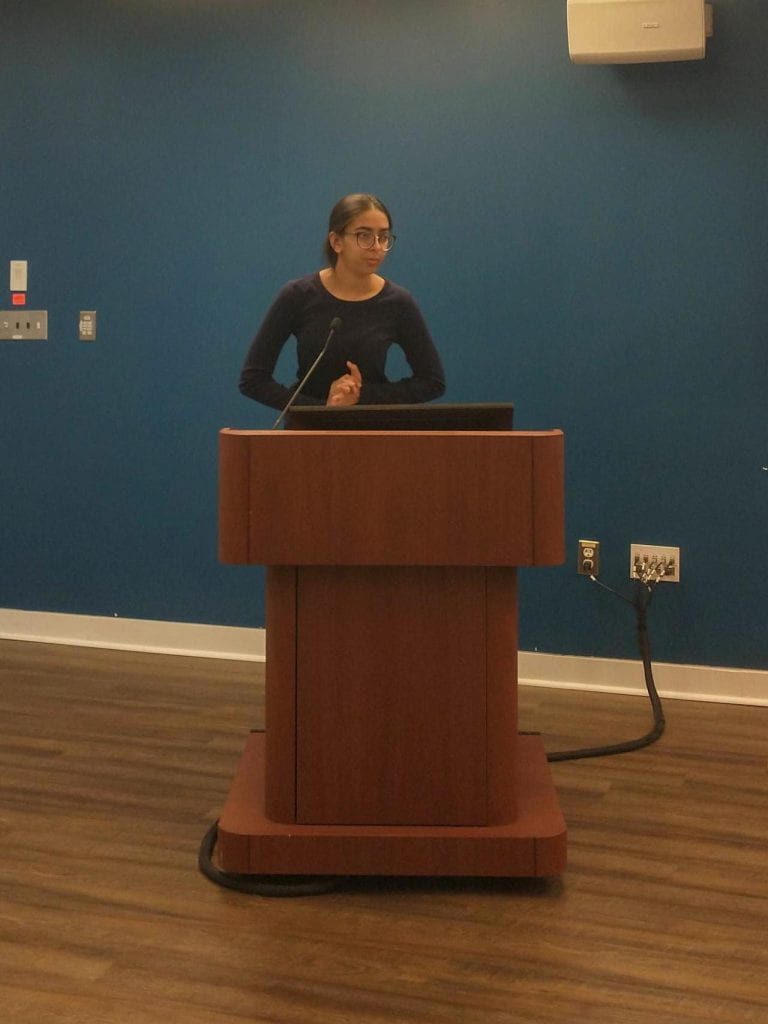
The students were interested in learning about how misinformation influences public perception of humanitarian crises but also sought to understand how these perceptions impact the effectiveness of humanitarian action and initiatives. The HAI Student Advisory Council learned about how we, as students, can work towards increasing humanization and drawing attention to humanitarian work.
International Humanitarian Law and the Conflict in Israel and Palestine
October 27, 2023
International Humanitarian Law (IHL), also known as the “laws of war,” consists of a series of legal instruments that govern the conduct of belligerents in situations of armed conflict. The central aim of IHL is to protect civilians by limiting the means and methods of warfare to reduce unnecessary harm and suffering. IHL stipulates key principles–distinction, proportionality, and precaution–to regulate the conduct of hostilities. Violations of IHL hinder civilian protection, impede humanitarian access, and disrupt humanitarian assistance.
This panel adopted the perspective of IHL to analyze the current conflict between Israel and Hamas and the effects on civilians. What key rules of IHL are applicable in this crisis? What are the status and obligations of the parties to the conflict under IHL? Under IHL, who is responsible for protecting civilian populations and their rights, and for ensuring humanitarian access? How is IHL enforced and how are violations addressed? What are the obligations of the international community?
Panelists
Maryam Z. Deloffre, Ph.D, Director, Humanitarian Action Initiative and Associate Professor of International Affairs, George Washington University
Robert Goldman, J.D., Professor of Law and Louis C. James Scholar, American University Washington College of Law
Lakmini Seneviratne, L.LM, Head of the Legal Department at the ICRC Washington delegation
Andrea Liese, Ph.D., Professor of International Relations, University of Potsdam (Germany)
Panel Discussion on the Crisis in Sudan
September 22, 2023
A panel discussion on the current crisis in Sudan cosponsored by the Institute for Middle East Studies and the Arab Center Washington DC. Panelists will discuss the drivers of the conflict, the militarization of politics and General Hemedti’s rise, as well as the consequences of the conflict, including implications for food security, the resulting humanitarian crisis, spillover effects on neighboring countries, and potential economic damage. Finally, panelists will discuss efforts to mitigate the impacts and resolve the conflict, such as the work of resistance committees and the farmers union in helping people survive, regional and international mechanisms to end war, and the role of other external actors, particularly the Gulf states.
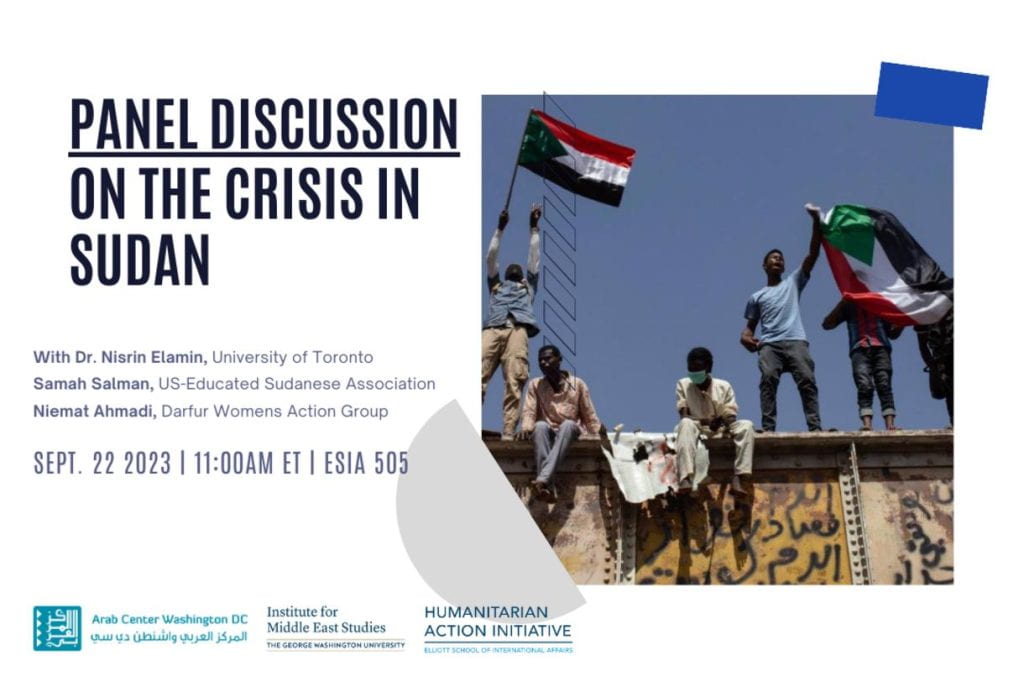
Speakers
Dr. Nisrin Elamin Assistant Professor of Anthropology and African Studies at the University of Toronto.
Samah Salman – President, US-Educated Sudanese Association (USESA)
Niemat Ahmadi – Founder and President of Darfur Women Action Group and the Founder and CEO of Unique22 LLC Strategies
Humanitarian Protection and Counter-trafficking in Crisis Situations: Focus on Ukraine
May 3, 2023
Chissey Mueller (Senior Protection Coordinator) and Iryna Mydlovets (National Protection Officer) from IOM Ukraine provided an update and overview of counter-trafficking and protection issues in Ukraine. The briefing included an overview of mobility trends, protection threats (forms of harm), protection needs and responses, and IOM’s programming in Ukraine.
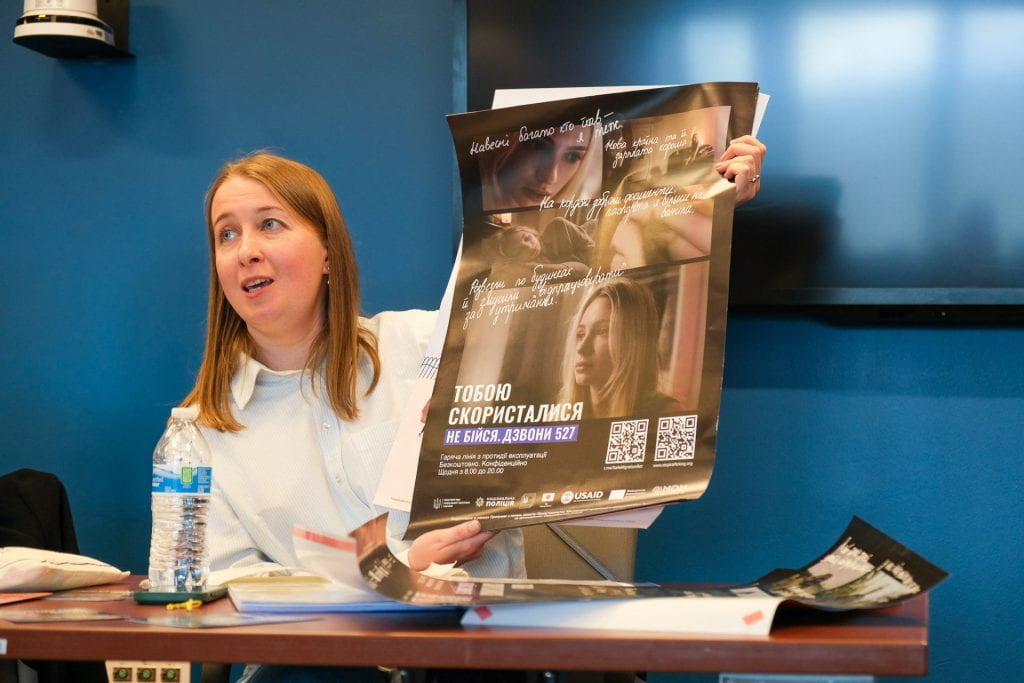
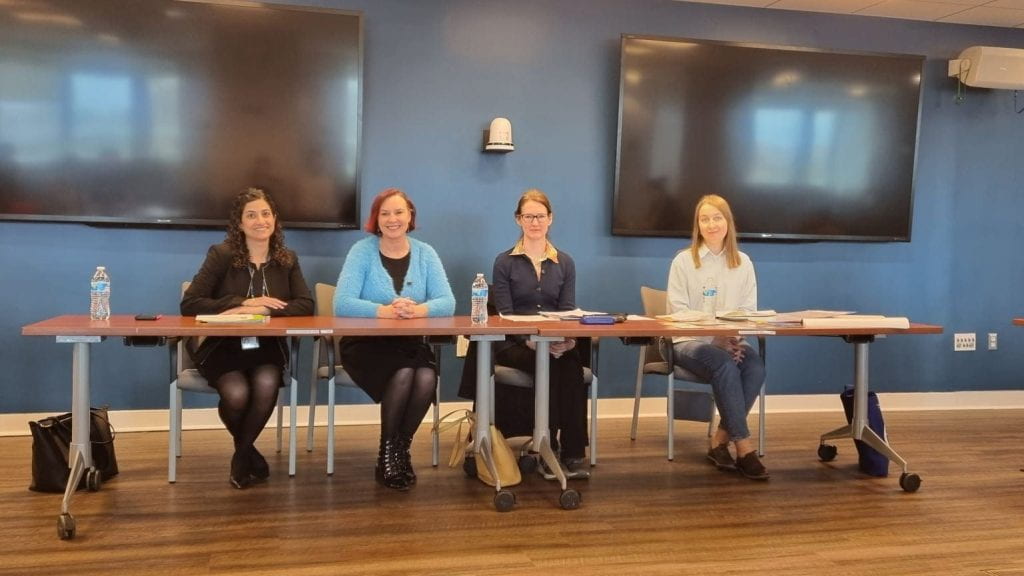
Real Talk: Entering the Humanitarian Field as a Young Professional
April 13, 2023
The event featured a roundtable with recent GWU alumni who are working in the field of humanitarian assistance as well as a networking reception. Students from across the campus heard advice on how to navigate the job market, how to prepare for an interview, how to network effectively, and how to build a professional career. We are grateful to our distinguished panelists for spending their evening with us and sharing their advice and insights.
Panelists – Elizabeth Ake (IDS ‘ 16) – Deputy Team Lead for Syria, Bureau for Humanitarian Assistance, USAID; Ashley Bustillo (MAIA ’21)- Humanitarian Programme Specialist, Airlink; Lydia Delmatta (IDS ’21)- Program Specialist, Bureau for Humanitarian Assistance, USAID; Abdulai Kamara (IDS ’21)- Humanitarian Specialist for the Civil Society and Localization Team, Bureau for Humanitarian Assistance, USAID; Alexandra Hernandez-Pardo – Resource Development Manager, African Community Center DC Metro; Renea Williams (IDS ’21) – Lead Associate (Proposal Pricing) for New Business Development, International Programs at Save the Children; Jody Yasinowsky (GWSB ’02) – Senior Managing Director of Humanitarian Portfolios, Save the Children
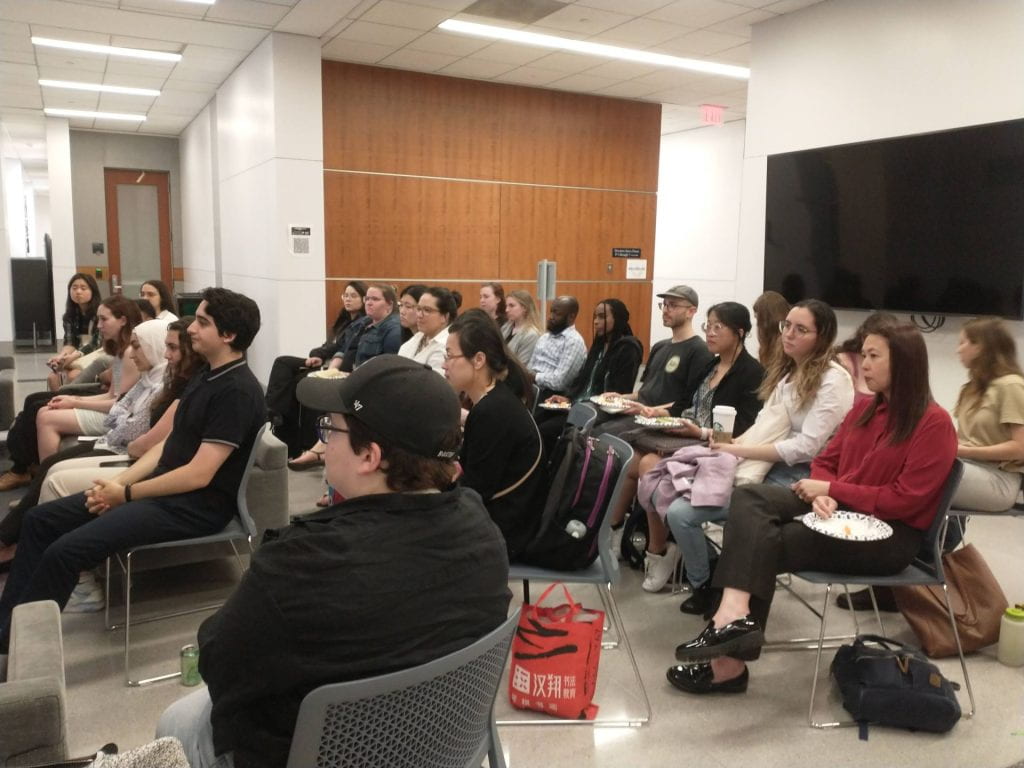
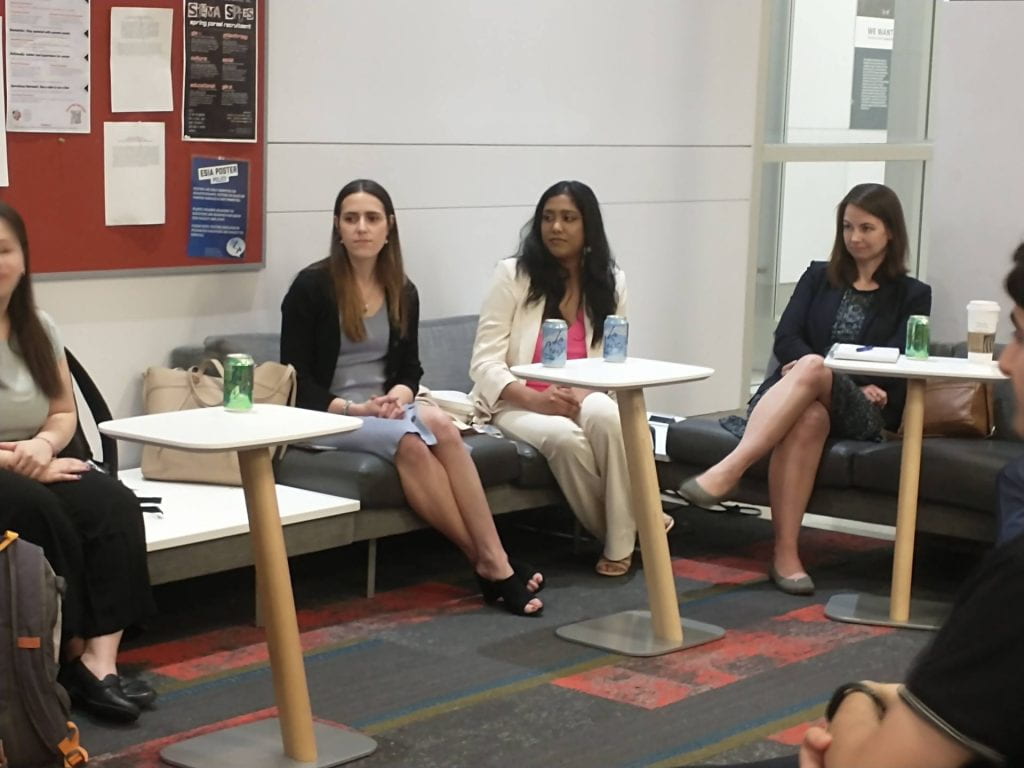

Woman, Life, Freedom: International Women’s Day Event featuring Azar Nafisi
March 8, 2023
Azar Nafisi, renowned Iranian-American author of Reading Lolita in Tehran and Read Dangerously, joined us on International Women’s Day for a discussion and reception. Nafisi discussed the women-led protests in Iran and her experiences as a feminist and an Iranian woman in exile. Her keynote address was followed by a student-led Q&A.
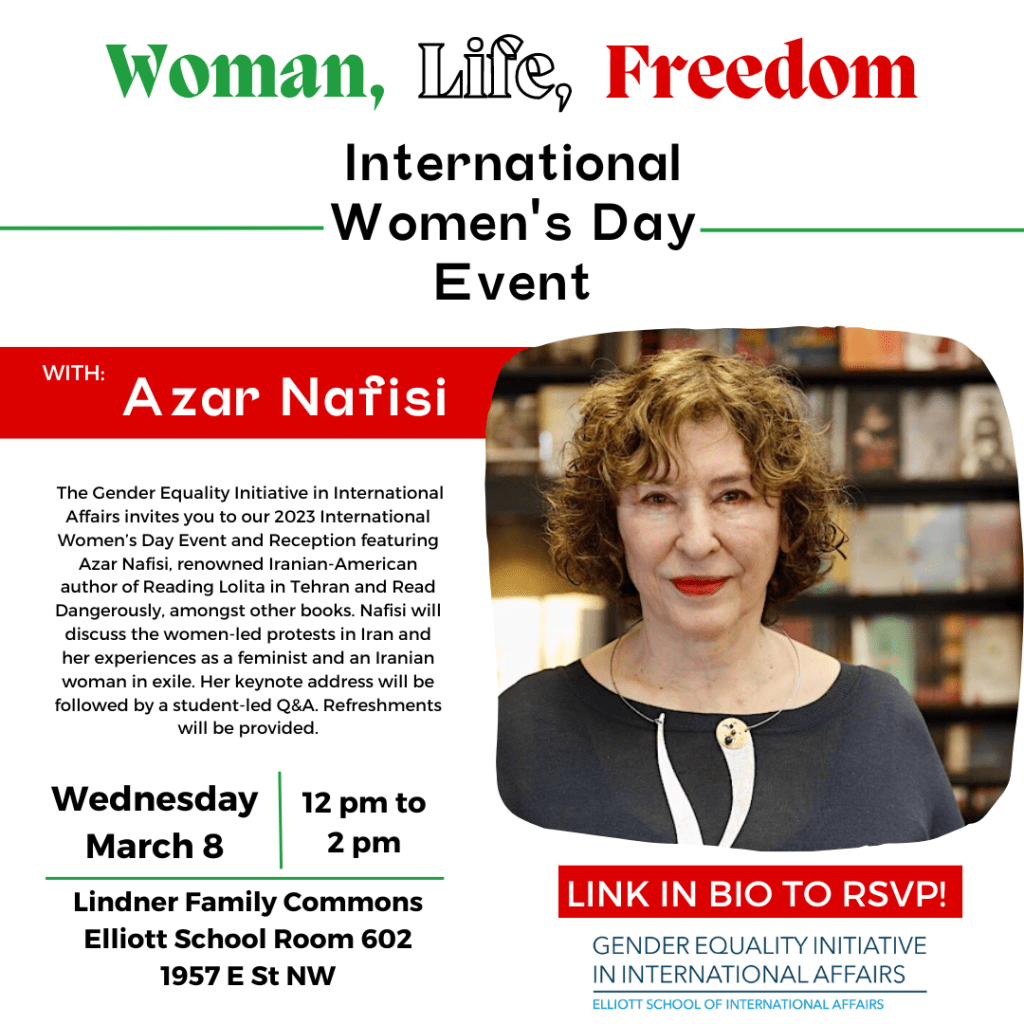
Anthroencryption: Strategies for protecting vulnerable populations
February 23, 2023
Timothy Quinn of the Dark Data Project, discussed their new white paper, Anthroencryption: Strategies for protecting vulnerable populations. In the era of Big Data, protecting data about people remains a challenging and underappreciated area of risk for most organizations, and securely sharing that data a significant impediment. This talk provides a better understanding of the tiered reality of identity protection, outlining appropriate strategies suitable to the needs of vulnerable people in a wide variety of contexts.
Teach-In on the Earthquakes in Turkey and Syria
February 15, 2023
At the each-In on the Earthquakes in Turkey and Syria, panelists discussed the on-the-ground realities of individuals living in the disaster areas as well as the challenges shaping the humanitarian response. Panelists also discussed the broader historical, economic, social and political contexts in which this acute crisis is embedded and how these factors will affect longer-term outcomes. Read more about the Teach-In from GW Today and The GW Hatchet.
Real Talk: Realities of Refugee Assistance and Resettlement
January 26, 2023
Panelists discussed the realities of providing resettlement assistance to refugees arriving in the United States. They described their work and how it relates to refugee services and resettlement; explained the process of resettlement involve; discussed the main challenges that refugees face in resettlement and detailed how different organizations from the U.S. government to NGOs work with each other and coordinate to provide refugee and resettlement services.
Panelists:
Nicole Medved (Alanko), Immigration Clinic Attorney Fellow, William & Mary Law School Immigration Clinic
Olivia Issa, Program Lead at the Refugee Resettlement Initiative at the National Association of System Heads (RRI at NASH)
Manizha Azizi , Family Services Manager, Homes not Borders
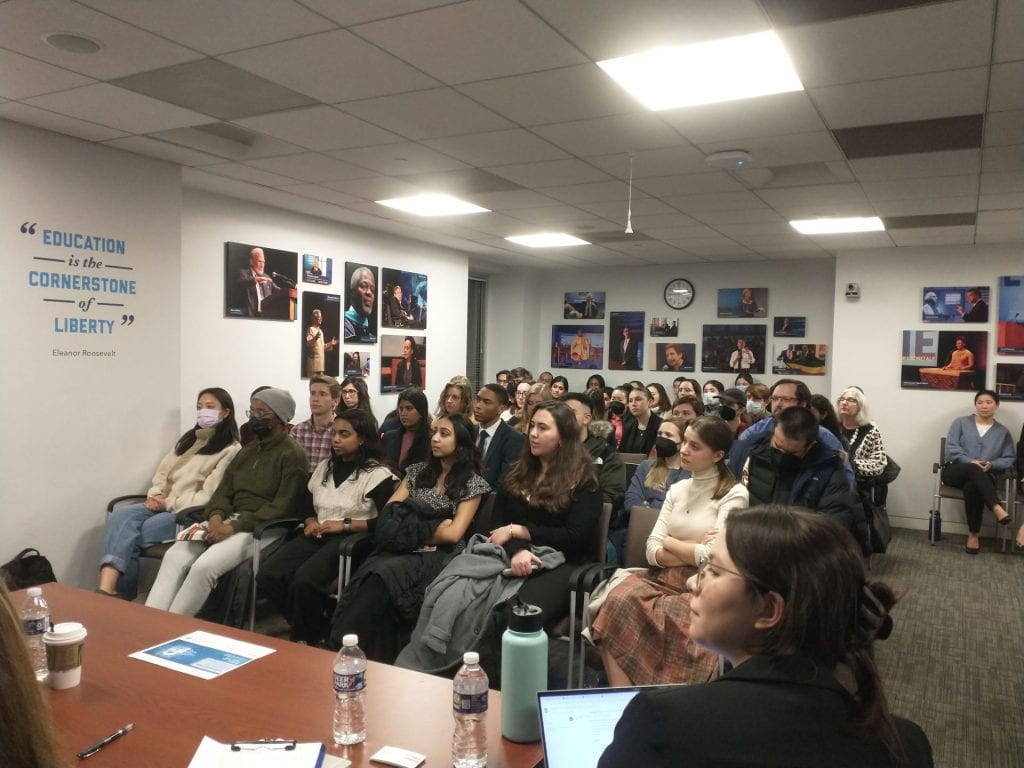
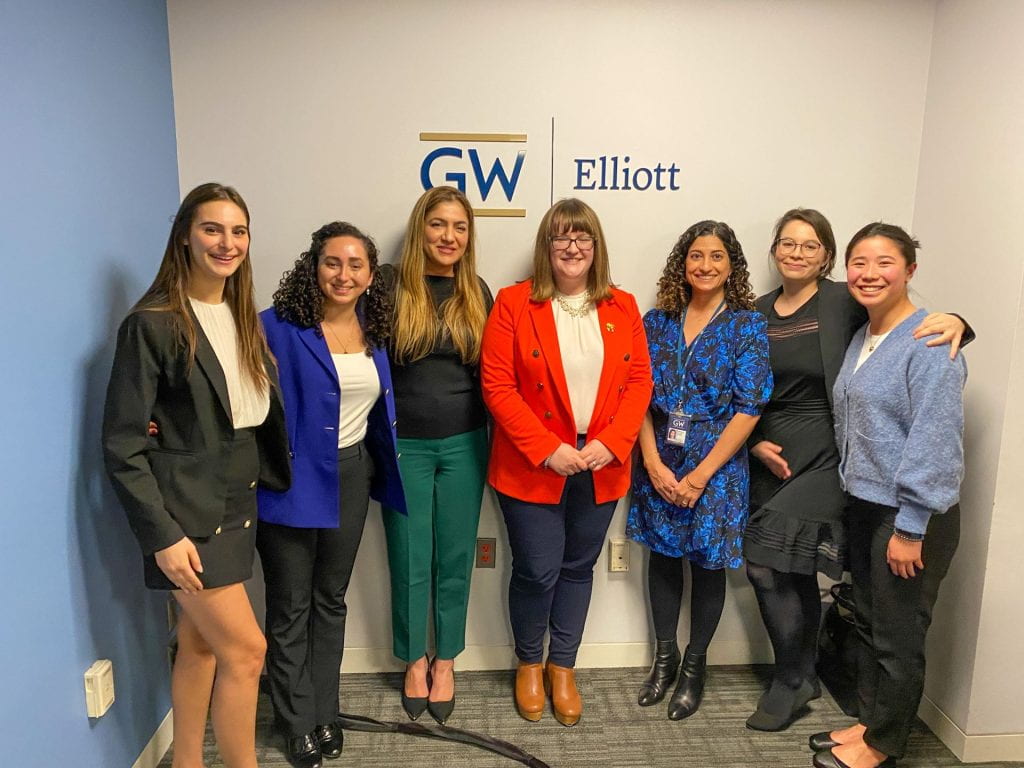
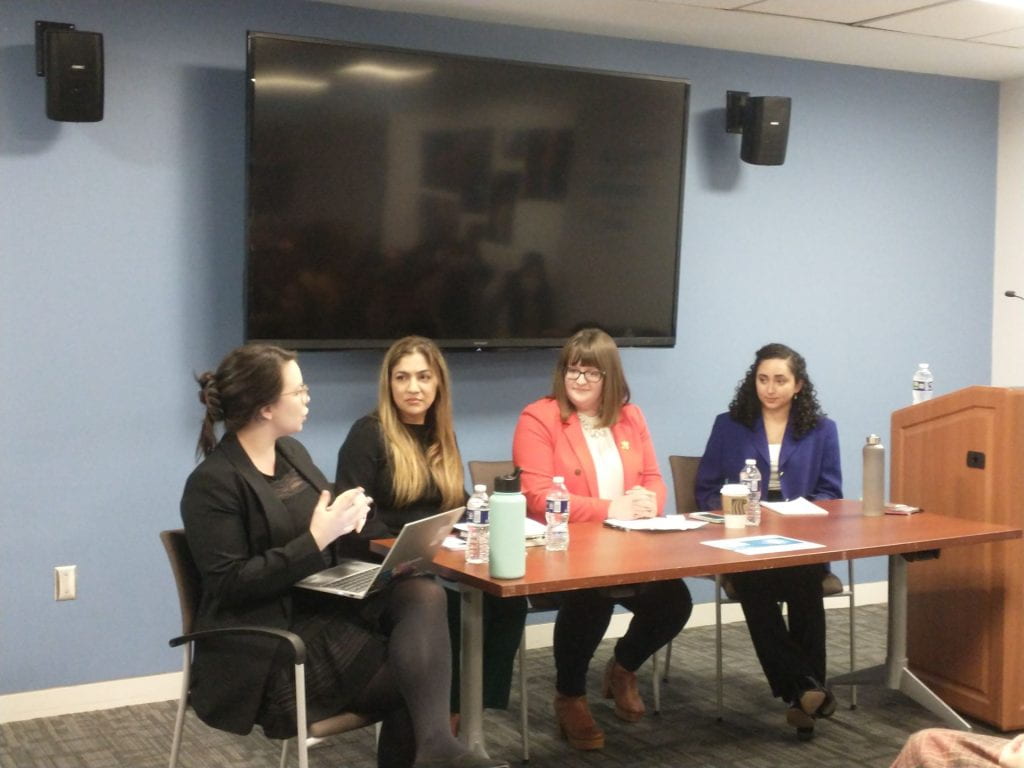
Beyond Despair
December 9, 2022
Michael Barnett, University Professor of International Affairs and Political Science, and Maryam Z. Deloffre, Associate Professor of International Affairs and Director, Humanitarian Action Initiative, co-hosted, with Community World Service Asia (CWSA), a half-day conference, “Beyond Despair,” at the Regional Humanitarian Partnership Week (RHPW) meetings in Bangkok, Thailand. The RHPW is organized by Asian Disaster Reduction & Response Network (ADRRN), CWSA, the International Council of Voluntary Agencies (ICVA) and the United Nations Office for the Coordination of Humanitarian Affairs (UNOCHA) and is the largest gathering of humanitarian actors in the region. In Beyond Despair, Barnett and Deloffre focused on the positive–how do humanitarian actors leverage their creativity and pragmatism to provide aid despite access challenges and structural barriers? Professor Barnett presented data from a survey conducted last year with Smruti Patel of Global Mentoring Initiative (GMI) and Political Science Ph.D. student Alex Vandermaas-Peeler, on the nature and sources of structural barriers – racism/colonialism embedded in attitudes and institutions, funding (and lack thereof), access constraints etc. Professor Deloffre then led a discussion on how humanitarian actors bypass these barriers to provide life-saving assistance. Over 250 practitioners, policymakers and academics from Asia, the Middle East and Africa attended the session.
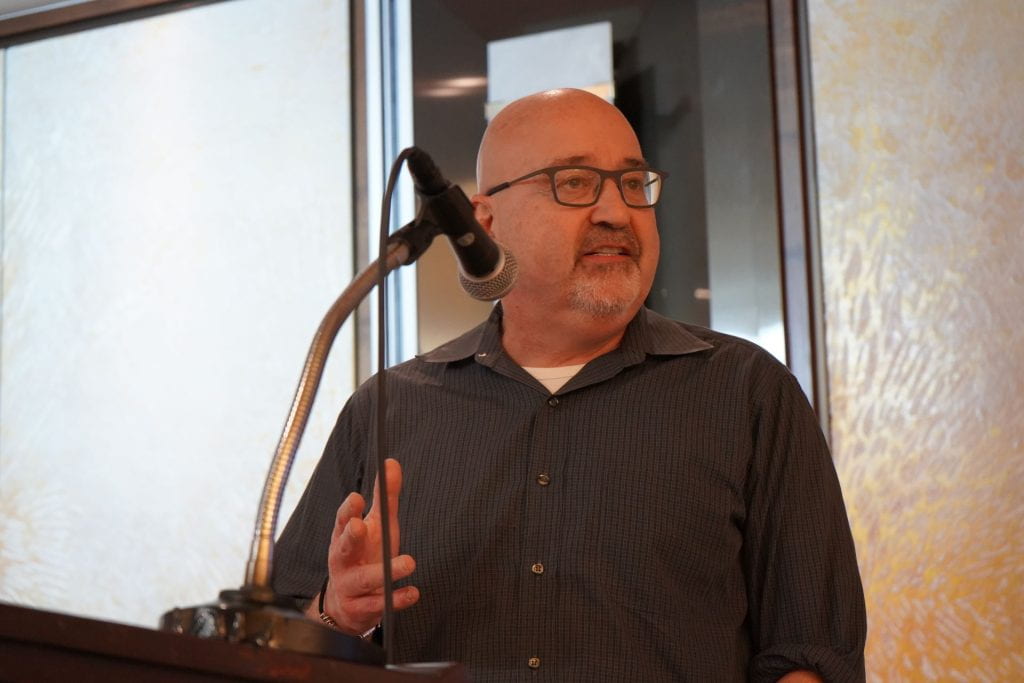
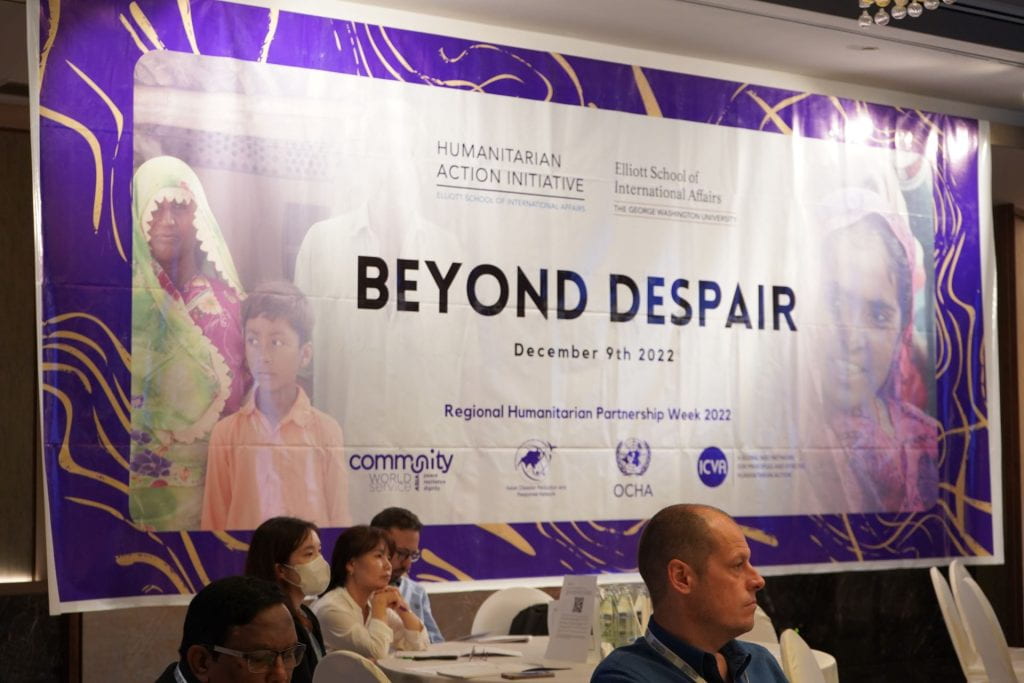
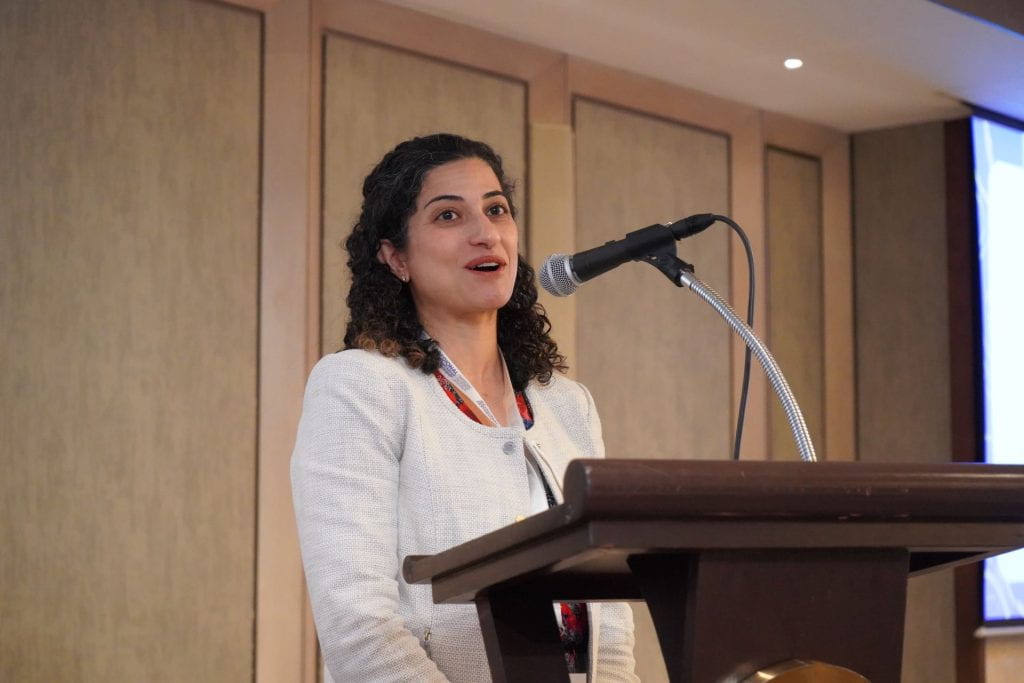
Iran Protests, What’s Different this time?
November 1, 2022
As large scale protests and demonstrations continue in Iran, a key question is: What about these events is different? Will the government make concessions on women’s social and political grievances? How are other groups – like organized labor and political activists – working to support the demonstrations, and how are international actors supporting (or undermining) this wave of activism? This conversation brings together three experts on Iranian politics and history to address these and other pressing questions.
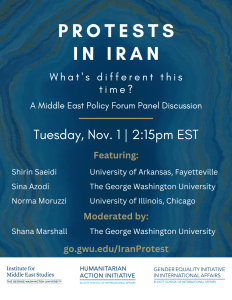
Who defines humanitarianism? Challenging the International Imaginary of Aid.
May 3, 2022
This panel explores the global emergency imaginary, how we think about, narrate, and frame what constitutes a humanitarian emergency and what it means to do humanitarian work. Humanitarian action is imagined to be politically neutral and impartial, delivered by international organizations, and conceived as short-term responses to urgent, exceptional crises. Lauren Carruth (American University) and Hugo Slim (University of Oxford) challenge this conventional imaginary and offer new understandings of what it means to do humanitarian work. Hugo Slim, in Solferino 21 (Hurst 2022), argues political solidarity and geographic proximity will increasingly form the foundation of humanitarian action. In Love and Liberation: Humanitarian Work in Ethiopia’s Somali Region (Cornell 2022), Lauren Carruth provides an alternative vision of what humanitarian response means in practice, driven by what Somalis call samafal or the cultivation of lasting relationships of care, interdependence and solidarity. Join us as Carruth and Slim discuss their books and debate the meaning of humanitarian work. Maryam Z. Deloffre (George Washington University) will facilitate the discussion.
Vortex: Book Launch Event
April 25, 2022
The Vortex: A True Story of History’s Deadliest Storm, an Unspeakable War and Liberation. It’s a timely book that tells the story of how a storm that killed half a million people in 1970 is an omen for the worst case scenarios of our collective climate change nightmare.
Carney and Miklian tell this incredible true story through the eyes of a soccer star turned soldier, a Miami weatherman, a drunken and genocidal President, a Boston teacher turned aid worker and a student turned revolutionary who all played crucial roles in Bangladesh’s birth. Drawing upon more than 1,000 sources and interviews compiled over five years, The Vortex shows why every new megastorm is a roll of the dice that can obliterate existing political order and rip societies into conflict.
Panelists:
Scott Carney, author, The Vortex Jason Miklian, author, The Vortex Marcus King, John O. Rankin Associate Professor of International Affairs; Director, M.A. Program in International Affairs, George Washington University Deepa Ollapally, Research Professor of International Affairs; Associate Director, Sigur Center for Asian Studies, George Washington University; Maryam Z. Deloffre, Associate Professor of International Affairs and Director, HAI.
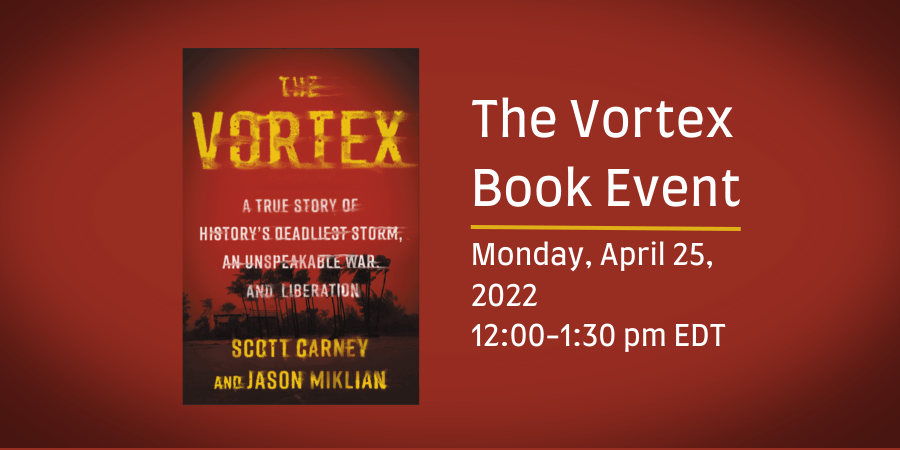
Implementing US Foreign Assistance: UN, NGO, and Contractor Perspectives
April 20, 2022
The US Government provides about 20% of all official development assistance funding, including 30% of all official humanitarian assistance funding, in the world. This funding mainly goes to international organizations, non-governmental organization grantees, and private contractors who implement assistance activities on the ground. How do these organizations carry out foreign assistance operations and programming? What goes into planning these programs and how do they manage donor expectations? Our panelists will provide their perspectives on the key decisions and processes they consider and undertake when implementing foreign assistance.
Panelists
Kathryn Prudhomme, World Food Program; Kathy Stroker, General Counsel for FHI 360; Brian Roemer – General Counsel for Abt Associates; Moderator – Amit Khardori, Professorial Lecturer, The George Washington University and Attorney Advisor, USAID.

Providing Humanitarian Assistance: Aid modalities and On-the-ground Realities
March 23, 2022
The delivery of humanitarian assistance is a complex endeavor. It requires cooperation among donor governments, international organizations, non-governmental organizations (NGOs), local governments, and, at times, local non-state actors. Coordination and cooperation are complicated both by the security, infrastructural, and political realities on the ground but also by the legal, fiduciary, operational and logistical requirements and procedures of donor governments and international organizations. Humanitarian aid providers must navigate these complex contexts and rules while negotiating access to humanitarian settings and calculating their legal, fiduciary, security and reputational risks.
This panel will provide key perspectives on the full spectrum of these risks and constraints, from the point of view of policy advisors, government agencies, donors and implementers. Each panelist will describe efforts to work within these constraints, identify successes and challenges, and discuss prospects for reform.
Panelists: Jacob Kurtzer, Director and Senior Fellow, Humanitarian Agenda, Center for Strategic and I nternational Studies (CSIS); Jennifer Hendrixson White, Senior Policy Advisor U.S. Mission to the United Nations (Washington), Department of State; Taylor Stager, Deputy Director (Acting), Office of Humanitarian Business and Management Operations, Bureau for Humanitarian Assistance, USAID; Brian White, Vice President and General Counsel, Save the Children.
Moderator: Amit Khardori, Professorial Lecturer, The George Washington University and Attorney Advisor, USAID
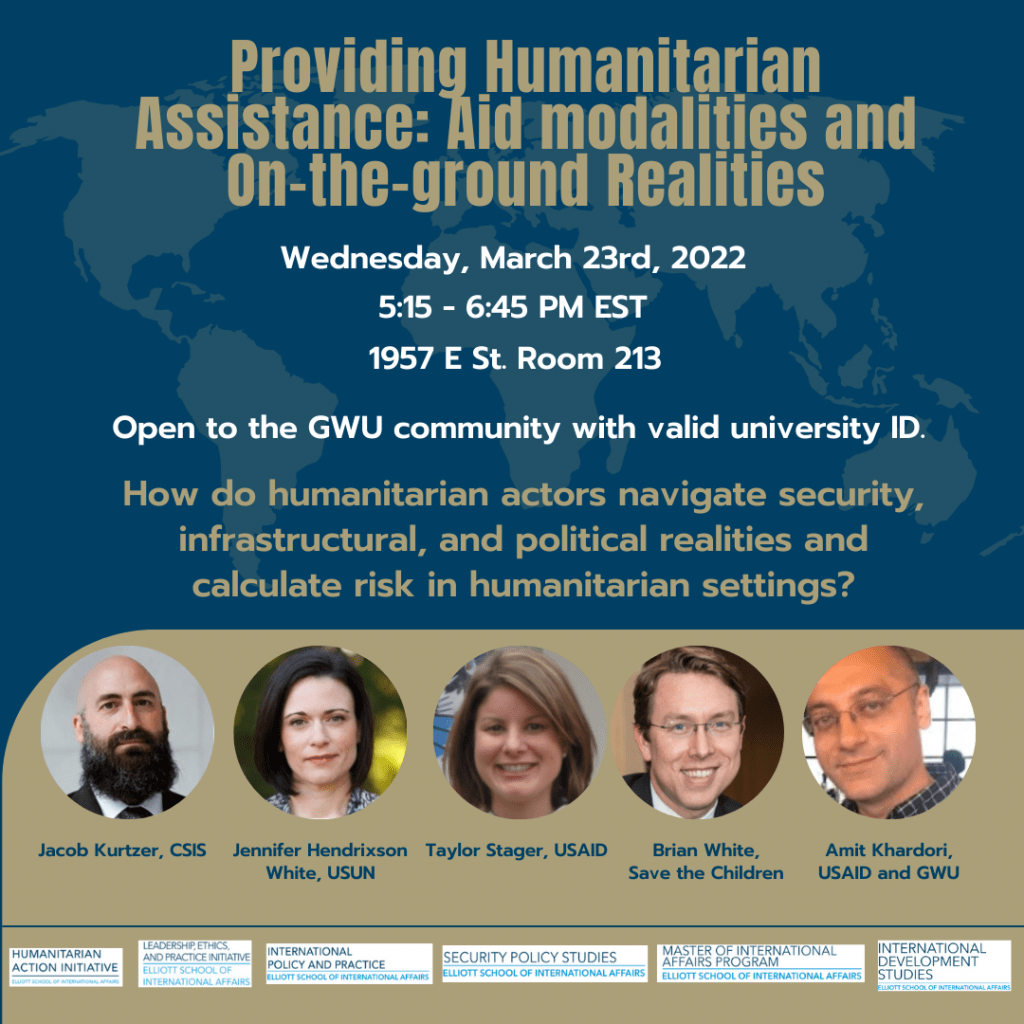
On Civilian Harm
January 26, 2022
On Civilian Harm (PAX), draws attention to the broader negative impact that violent conflict and international interventions have on civilians, challenging stakeholders to broaden the scope from civilian deaths as impact of conflict, to also include property damage, psychological trauma, displacement, and so on. In this event, Erin Bijl (one of the authors) explains how the book’s case studies and themes expand our traditional understanding of civilian harm. Marc Garlasco (ESIA MA ’95) discusses how organizations investigate civilian casualties in the field. He has conducted investigations for the US military, the United Nations, and NGOs and will discuss the different methodologies and challenges faced by these organizations conducting this research. Finally, he will discuss how the Department of Defense is dealing with recent civilian casualty incidents such as the Kabul drone strike and Barghouz strike in Syria. Brittany Roser explains PAX’s advocacy with the United Nations and how they are working to get UN missions to improve civilian protection. Dr. Maryam Zarnegar Deloffre, Director of the Humanitarian Action Initiative at GWU, shares her insights on the book and the implications for humanitarian action. Dr. Paul D. Williams serves as the moderator for this talk.
Myanmar in Crisis
December 7, 2021
Since the February 2021 coup, Myanmar has been plunged into a political and humanitarian crisis. What has this meant for the people of Myanmar and how are they seeking to overcome these deep challenges? In this special event, we will begin with a viewing of “Padauk: Myanmar Spring,” a short film documenting citizens’ efforts to reverse the coup. The viewing will be followed by a panel discussion featuring three commentators from Myanmar: Nant Ingyin Kyaw Soe, a Kayin-Bamar activist who is featured in the film, Ye Myo Hein, Executive Director of the Tagaung Institute of Political Studies and Public Policy Fellow with the Asia Program at the Woodrow Wilson International Center for Scholars, and Dr. Si Thura, Executive Director, Community Partners International. Tom Andrews, United Nations Special Rapporteur on the situation of human rights in Myanmar, will deliver opening remarks.
Dr. Christina Fink, Elliott School of International Affairs and Dr. Adam Richards, Milken Institute School of Public Health, the George Washington University, will facilitate the discussion.
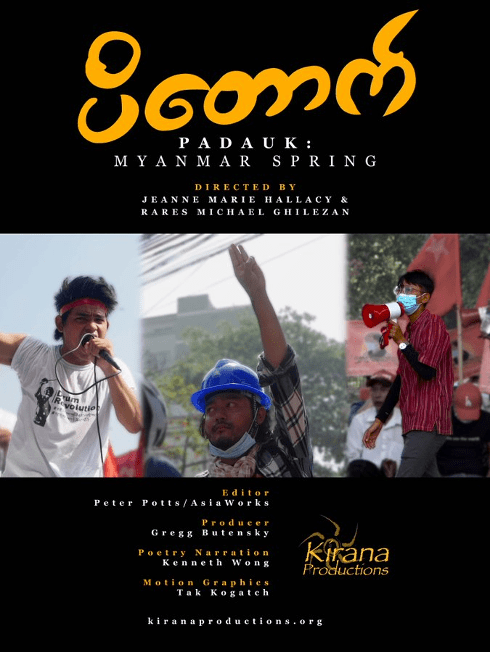
Promoting Justice across Borders: The Ethics of Reform Intervention
September 23, 2021
Lucia Rafanelli, Assistant Professor of Political Science and International Affairs at the Elliott School andAlyssa Ayres, Dean of the Elliott School of International Affairs at George Washington University, discuss Rafanelli’s new book,Promoting Justice Across Borders: The Ethics of Reform Intervention.
About the Book
Global political actors, from states and NGOs to activist groups and individuals, exert influence in societies beyond their own in myriad ways-including via public criticism, consumer boycotts, divestment campaigns, sanctions, and forceful intervention. Often, they do so in the name of justice-promotion. While attempts to promote justice in other societies can do good, they are also often subject to moral criticism and raise several serious moral questions. For example, are there ways to promote one’s own ideas about justice in another society while still treating its members tolerantly? Are there ways to do so without disrespecting their legitimate political institutions or undermining their collective self-determination? Promoting Justice Across Borders: The Ethics of Reform Intervention aims to tackle these questions.
The Frontlines of Peace by Séverine Autesserre
September 22, 2021
You are invited to join the Security Policy Studies (SPS) Program, the Humanitarian Action Initiative (HAI), the Institute for Security and Conflict Studies (ISCS), and the Leadership, Ethics, and Practice (LEAP) Initiative, for an in-person presentation and discussion with Dr. Séverine Autesserre on her new book, The Frontlines of Peace. Dr. Autesserre is an award-winning author, peacebuilder, and researcher, as well as a Professor of Political Science at Barnard College, Columbia University. This event will be moderated by Dr. Michael Barnett, University Professor of International Affairs and Political Science at the George Washington University.
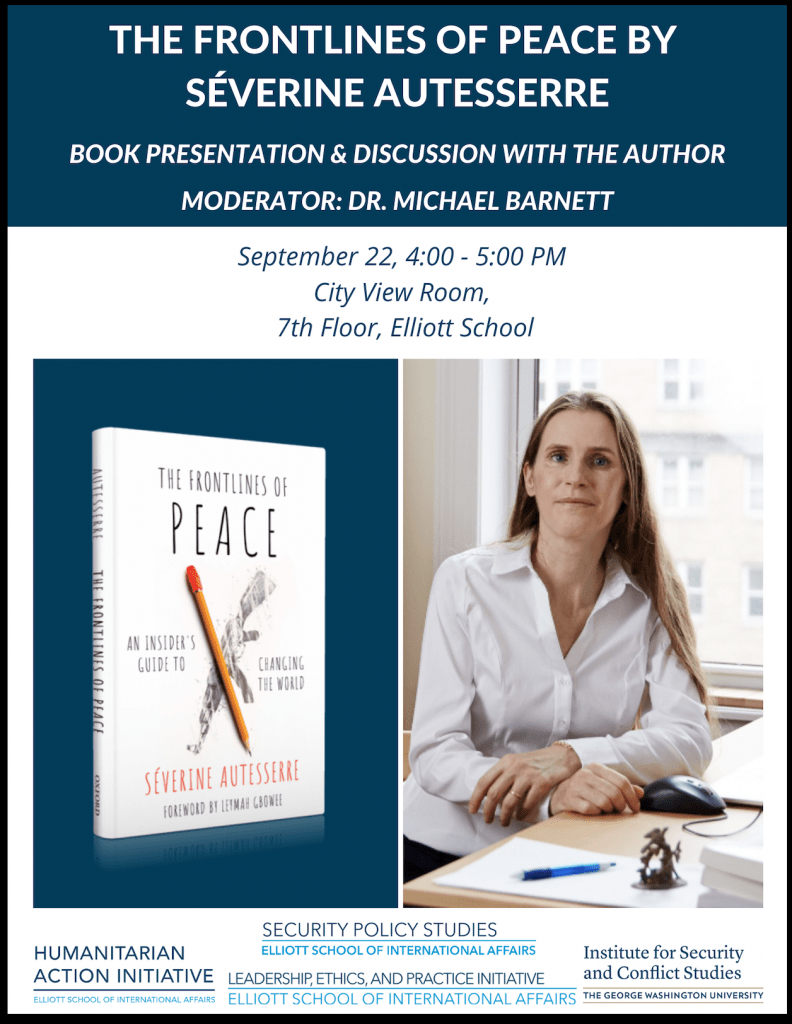
Humanitarian and Political Crisis in Haiti: A roadmap for the future
September 17, 2021
In mid-August, Haiti was struck by both a 7.2 magnitude earthquake, which devastated the southwestern part of the country, and Tropical Storm Grace. Both occurred during a period of political instability caused by intense and persistent gang violence, and massive political protests against President Jovenel Moïse, which ended with his assassination in July. Haitian officials estimate over 600,000 individuals are in need of humanitarian assistance, but relief has been slowed by impassable roads, mudslides resulting from heavy rains, and gang violence. Despite these hazards, locally-led community groups, many formed after the 2010 earthquake, are providing immediate assistance and care. The cumulative effects of these events risk further destabilizing fragile political and economic systems. Panelists will discuss the historical and political context in Haiti, the current political and humanitarian situation, as well as pathways forward.
Panelists – Alyssa Goldstein Sepinwall, Professor of History, California State University San Marcos; Jean Eddy Saint Paul, Professor of Sociology, former Founding Director of the CUNY Haitian Studies Institute Brooklyn College of the City University of New York; Louino ‘Robi’ Robillard, co-founder of Konbit Soley Leve movement; Konbit Bibliyotek Site Soley and Program Director of Future Generations Haiti and Rasin Devlopman; Cécile Accilien, Chair of the Department of Interdisciplinary Studies and Professor of African and African Diaspora Studies, Kennesaw State University; Emmanuela Douyon, founder of POLICITÉ and leader of Nou pap dòmi and Petrochallenger; Sabina Robillard, Associate on Humanitarian Aid and Accountability at CDA Collaborative Learning, a researcher at the Feinstein International Center at Tufts University, and a doctoral candidate at Tufts University
Dean’s Book Talk: Humanitarianism and Human Rights: A World of Differences?
April 20, 2021
Humanitarianism and Human Rights: A World of Differences? (Cambridge University Press) explores the fluctuating relationship between human rights and humanitarianism. Leading scholars probe the shifting meanings of human rights and humanitarianism across ethics, obligations, duties, history, and modern-day practice. Dean Alyssa Ayres and the GW Elliott School of International Affairs Book Launch Series are proud to present a discussion of the book led by its editor, Michael Barnett, and co-sponsored by the Humanitarian Action Initiative. Chapter authors, Illana Feldman (George Washington University) and Miriam Ticktin (The New School for Social Research) discuss their research and contribution to the book. Maryam Z. Deloffre, Associate Professor of International Affairs and Director, HAI will moderate the discussion.
The COVAX Initiative and Equitable Global Vaccine Distribution
February 26, 2021
On Friday, February 26, we co-hosted a roundtable discussion The COVAX Initiative and Equitable Vaccine Distribution with panelists Loyce Pace, Biden-Harris COVID-19 Advisory Board Member and President of the Global Health Council President; Dr. Jeremy Youde Dean of the College of Liberal Arts at the University of Minnesota Duluth; Dr. Jon Andrus, Adjunct Professor of Global Health at George Washington University, and Dr. Adam Jachimowicz, Lecturer Emergency Management. Maryam Z. Deloffre, Associate Professor of International Affairs and Director, HAI will moderate the discussion.
Converging Crises in the Sahel: Situation Update and Path Forward
February 3, 2021
A situation update on the Sahel region from Mohamed Ibn Chambas, Special Representative of the UN Secretary-General and Head of the UN Office for West Africa and the Sahel, and El-Ghassim Wane, Visting Shapiro Professor of International Relations, Elliott School of International Affairs
Information Here: https://iafs.elliott.gwu.edu/
Ethiopia’s Tigray Crisis: Humanitarian and Political Dimensions of the Crisis
December 4, 2020
As the Tigray crisis began to escalate, we co-hosted a panel discussion with Elizabeth Hume, Vice President, Alliance for Peacebuilding, Patrick Youssef, Regional Director for Africa, ICRC, Beza Tesfaye, Director of Research and Learning, Migration and Climate Change, MercyCorp, and Hardin Lang, Vice President for Programs and Policy, Refugees International. Jennifer Cooke, Director of the Institute of Africa Studies and Maryam Z. Deloffre, Director of the Humanitarian Action Initiative, will serve as moderators.